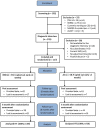Internet-based stress management for distressed managers: results from a randomised controlled trial
- PMID: 28855344
- PMCID: PMC5800342
- DOI: 10.1136/oemed-2017-104458
Internet-based stress management for distressed managers: results from a randomised controlled trial
Abstract
Objective: The aim of this randomised controlled trial (RCT) was to evaluate the efficacy of a guided internet-based stress management intervention (iSMI) among distressed managers compared with a attention control group (AC) with full access to treatment-as-usual.
Method: A total sample of 117 distressed managers, mainly employed in the healthcare, IT, communication and educational sector, were randomised to either iSMI (n=59) or an AC group (n=58). The iSMI consisted of eight modules including cognitive behavioural stress management and positive management techniques. Participants received a minimal and weekly guidance from a psychologist or master-level psychology student focusing on support, feedback and adherence to the intervention. Self-report data were assessed at pre, post and 6 months after the intervention. The primary outcome was perceived stress (Perceived Stress Scale-14). The secondary outcomes included mental and work-related health outcomes.
Results: Participants in the iSMI intervention reported significantly less symptoms of perceived stress (d=0.74, 95% CI 0.30 to 1.19) and burnout (d=0.95, 95% CI 0.53 to 1.37) compared with controls, at postassessment. Significant medium-to-large effect sizes were also found for depression, insomnia and job satisfaction. Long-term effects (6 months) were seen on the mental health outcomes.
Conclusion: This is one of the first studies showing that iSMIs can be an effective, accessible and potentially time-effective approach of reducing stress and other mental-related and work-related health symptoms among distressed managers. Future studies are needed addressing distressed managers and the potential of indirect effects on employee stress and satisfaction at work.
Keywords: burnout; intervention studies; manager; stress; stress management.
© Article author(s) (or their employer(s) unless otherwise stated in the text of the article) 2018. All rights reserved. No commercial use is permitted unless otherwise expressly granted.
Conflict of interest statement
Competing interests: None declared.
Figures
References
-
- Eurofound. Developments in working life in Europe 2015: EurWORK annual review. Luxenbourg: Publications Office of the European Union, 2016.
Publication types
MeSH terms
LinkOut - more resources
Full Text Sources
Other Literature Sources
Medical

